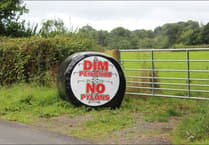Our students are back. I have missed them. For a zesty perk to life in The Vaults is being twice-weekly surrounded by my own children’s excitable generation. Life-affirming young people bursting with new perspectives. Fresh food for my middle-aged mind. Interested and interesting. Sharing the inspiring and confusing outlook of having one’s whole life ahead. Reaffirming that experience is no substitute for youth, yet still eager to hear from the old school.
Such salad days are prime times for experimentation, for new and challenging experiences, one of which is striking up an independent relationship with alcohol. For being legally permitted to buy alcohol has been long regarded as a significant threshold and its unsupervised consumption viewed as a seductive indicator of maturity - an initiation that all too often does not go well. For most of us can remember an alcoholic beverage that we overindulged in during this phase: half bottle of peach schnapps - flashbacks? - I can barely make my way down Lidl’s soft fruit aisle without stomach heaving.
So, for a grizzled bartender, how should Britain’s drug of choice be approached? Personally, I am an intentional and practised lightweight when it comes to drinking. A brain quickly turning to mush is not my idea of good company nor time well spent. Regretting more that I say (and do) is detrimental for my overly grandiose sense of self. I am also likely to be sick and any hint of hangover will completely wipe out at least the following day. For these reasons I view getting plastered as undesirable self-harm - the correct relationship with alcohol for an individual who makes a living behind a bar.
From my side of the bar, I get to watch how alcohol acts as a depressant, an effective tranquiliser that neither makes over-consumers more fascinating nor feel any better about themselves. And although the freeing and fortifying effects of getting a touch oiled can generate fun free-flowing chat, and although there is little that compares with the taste of spirits aged in the tropics for a couple of decades, stepping around Aberystwyth, day or night, illustrates the easy habit, the destructive mission that binge-drinking can almost instantly become.
As if needing a reminder, occasionally is found a young and slumped head (overindulged elsewhere, I hasten to add), a formative mind in turmoil, crying in confusion, conveying the likely-to-be-ignored lesson that alcohol does not drown sorrows but stokes miserable fires. A reminder that we could save ourselves a lot of pain were we to be persuaded that alcoholic drinks (like relationships) are best partaken when already feeling good about ourselves. Cup of tea? Glass of water? A taxi to take you home?
And we also understand that over the medium and longer term, alcohol abuse is a soul- and life-sapping elixir of inaction and ill-health. A fast-track to frustration, dissatisfaction, to unleashing those insecurities that vent as disfunction, crime and violence. Nothing new here. A substance that if recently discovered would be banned in an instant for its addictive qualities and antisocial consequences.
This is why selling alcohol (both on- and off-sales) bears legal responsibilities to oversee and to avert harm caused by the abuse of alcohol. A duty to keep a firm paternal eye on the youngsters, and a less preachy but fraternal eye out for those old enough to know better. A duty of care that a night tour of Aberystwyth (and any student town, I suppose) suggests might be taken a touch more seriously. An obligation to guide patrons towards associating alcohol with fun and pleasure, to protect from disorientation and pain. To dissuade from downing the unpalatable, bingeing upon the cheap as unnecessary but costly signalling to adulthood, bingeing out of habit, or as ineffective anaesthetic for trouble and misery. For I do not want my peach schnapps type of irretrievable aversion-therapy experience associated with drinking rum. Bad for business. Patrons encouraged to enjoy the socialising vibe. Seduced by tasty drink, not by drinking. Better for business. Better for everyone.
And anyway, conversations across the bar confirm easy society remains the primary motivation for stepping inside our bars and pubs. We are not here to get messed up, but to partake in the British drinking culture: people, friends, and community. We are here for the chat, the bants, an away-from-home, tongue-loosening environment in which to relax and ally. For grown-up therapy.
In this way, our night life remains a vital social tradition, a positive experience never more important than for a transitioning age-group that endured lockdown during foundational years, important years that for most of us involved roaming, raving, and continuously making friends. So get out, young and old. Get about. Society is good for us. Just remember to take it easy when it comes to the booze.





This article has no comments yet. Be the first to leave a comment.